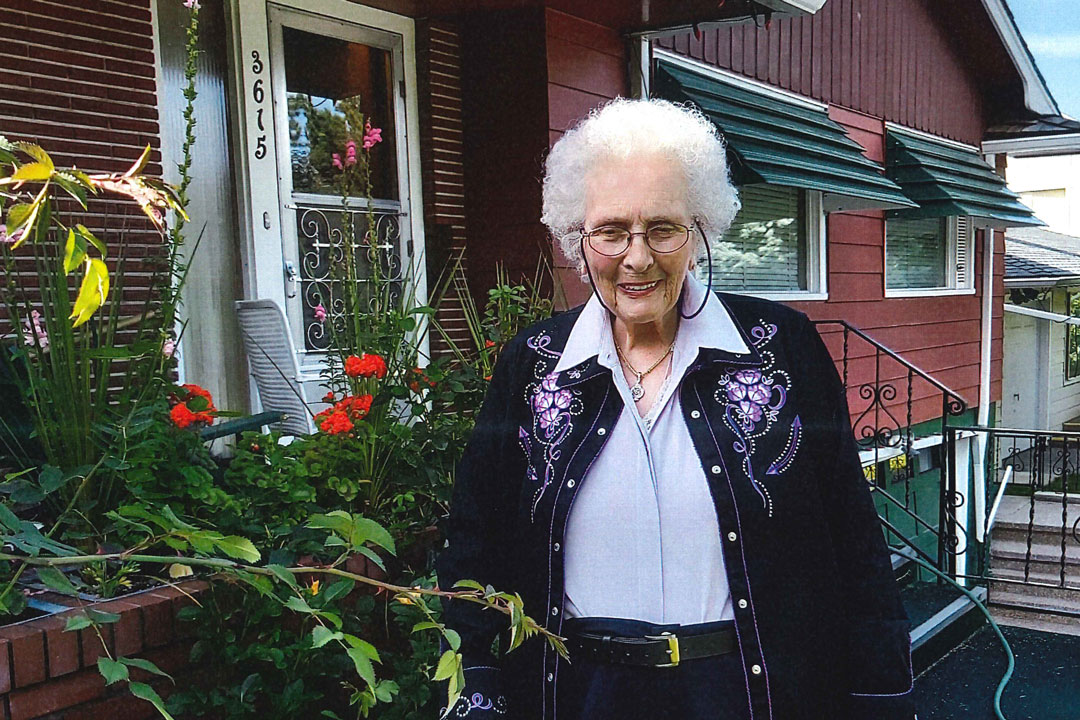
A legacy that will live on for generations
A land donation from Joan Snyder leads to new opportunities for AgBio.
By Jane CaulfieldThe idea of a legacy can mean different things for different people. Some will think of it as a donation of some kind, while others will think about it in terms of doing something or leaving something that has a lasting impact. For the College of Agriculture and Bioresources at the University of Saskatchewan (USask), a bequest of 2,240 acres of land just outside of Eatonia from Calgary philanthropist Joan Snyder (C.M., LL.D) is the kind of legacy that will enhance agricultural education for years to come.
A humble business leader with a long history of generosity
Snyder was born on February 20, 1932, in Kindersley and grew up in Eatonia. While the economic realities of the 1930s led to devastating hardships for families across the country, many who knew Snyder talk about how she learned the value of kindness and community from watching her parents work hard to persevere. That hard work eventually paid off and her father, Calvin, became one of the largest individual holders of mineral rights in Western Canada.
“They moved to Saskatoon and then in the early 1950s, they moved to Calgary, where Calvin continued his work in business. He died in 1961 and Joan and her mother, Phoebe, took over managing the family businesses, continuing to build value,” said Don Brownie, a business colleague and close friend of Joan’s.
After her mother passed away in 1991, Joan continued to manage the family businesses that included real estate, oil and gas holdings, and farming operations in both Saskatchewan and Alberta.
Brownie is quick to highlight Snyder’s caring nature and her keen interest in supporting the communities that she lived and worked in.
“While Joan was an accomplished businesswoman, she was always best known for her overwhelming generosity and her intense concern for the wellbeing of others,” said Brownie. “She was a huge supporter of women’s hockey. She made a generous and substantial contribution to the Dinos women’s hockey team at theUniversity of Calgary, helping them win the national championship in 2012. She also generously supported USask Huskies women’s hockey through a scholarship in memory of her mother.”
In 2000 she financed the creation of the Snyder Chair in Critical Care Research at the University of Calgary and a few years later she helped to fund the creation of the Snyder Institute for Chronic Diseases. She had a long history of supporting organizations that mattered to her including the Salvation Army, the Society for the Prevention of Cruelty to Animals, Agape Hospice, the Glenbow, Fort Calgary, the Calgary Zoo, Heritage Park, Meals on Wheels,
Wood’s Homes, and Mount Royal University. In 2011, she made a significant contribution to WinSport Canada in support of women’s hockey development at the local, national, and international levels. Through all of that, she continued to support the University of Saskatchewan.
“Joan and former USask President Peter MacKinnon developed a strong friendship,” said Brownie. “Although Joan was a proud Albertan, she was also proud of her Saskatchewan roots and the solid values the province represents.”
In 2011, the University of Calgary recognized Snyder’s history of generosity and awarded her an honorary Doctor of Laws degree. In 2013, she was recognized on a national level for her philanthropy and was honoured with the Member of the Order of Canada.
Snyder passed away on April 7, 2022, at 90 years of age.
A growing land base nurtures the college’s future
While the college’s full plan for the donated land will take time to develop, it is recognized as a transformative gift.
“We are immensely grateful for Joan Snyder’s donation and plan to honour her memory by being the best custodians of this land that we can be,” said Dr. Angela Bedard-Haughn (PhD), dean of the College of Agriculture and Bioresources.
USask currently owns more than 14,000 acres of land across the province, of which a significant portion contributes to AgBio’s mission. This most recent addition has significantly grown the college’s capacity as a leader in agricultural education and research.
“Joan’s forethought and commitment to her Saskatchewan roots will provide new research and teaching opportunities, including new opportunities to study crop varieties and agronomic practices of relevance to the more arid parts of the Prairies. In turn, this will ensure a more resilient agriculture sector and a better learning experience for our students who are the future leaders of the sector,” said Bedard-Haughn.
Together we will create inspired places for people to address the challenges of the future. We invite you to join by supporting visionary spaces at USask.

